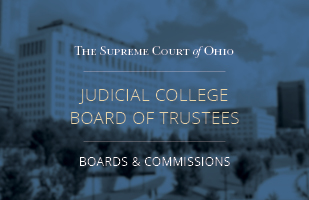Judicial College: Judges Furthering the Ohio Judiciary


Editor’s Note: This story is part of a series on the Ohio Supreme Court’s boards and commissions.
Expanding knowledge and adapting to changing landscapes are essential within the judiciary. For decades, that’s been the driving force behind the Ohio Supreme Court’s Judicial College.
Along with a full-time staff dedicated to raising the competency of judges, magistrates, and court personnel, the Judicial College has a board of trustees that advises the Supreme Court about judicial branch education and the College’s operations.
“Those representatives provide input on the way we deliver education in Ohio, and what we deliver,” said Christy Tull, the Judicial College’s director and the Court’s liaison to the board. “They inform much of what we do.”
Basis for Judicial College and Its Board
Established in 1976, the Judicial College is based on the pillars of continuing legal education to better serve the public as mandated in Rule IV of the Ohio Supreme Court Rules for the Government of the Judiciary of Ohio and section 10 of Rule X of the Court’s Rules for the Government of the Bar of Ohio.
The board of trustees was incorporated to ensure recipient input about the education and obtain insight from all factions of the judiciary.
It consists of 10 members, plus the chief justice, with representatives from all seven of the state’s judicial associations, the Ohio Association of Magistrates, and two at-large appointments made by the chief justice.
Involvement from each judicial association combines perspectives from the Ohio Judicial Conference and each court jurisdiction – appellate, common pleas, domestic relations, juvenile, probate, municipal and county – to make sure all voices within the judiciary are recognized.
RELATED:
Character and Fitness: Review, Reinforce Reputation
Bar Examiners: Legal Profession Gatekeepers
Anti-Bias Training Part of Judicial College’s Present and Past
Virtual Reality: Judicial College Conducts Conferences via Video
Within that representation, Tull says there’s even more inclusivity to “reflect the gender, ethnicity, geographic makeup, and other diverse demographics of our state.”
Those different backgrounds and specializations allow this select group of jurists to analyze the educational needs of the courts and the expectations of citizens they serve.
Recent examples of recommendations made by the Judicial College Board include mentoring requirements for new judicial officers, exploring whether to allow jurists more flexibility with their continuing legal education (CLE) by allowing more self-study hours, and discussing new magistrate orientation mandatory.
“Most board members are both students of the Judicial College and faculty,” said Franklin County Common Pleas Judge Stephen McIntosh, the board’s chair. “They are very much invested in the betterment of the judiciary through judicial branch education.”
Aiding All Parties
While the board “stays in its lane” as advisers, Tull adds that its care for enhancing the administration of justice includes working with other Supreme Court boards and commissions, and all parties that come into their courtrooms, including court-appointed guardians ad litem and guardians of adults.
The 10 members, who serve three-year terms with the option of being reappointed once, meet quarterly to deliberate about the Judicial College’s latest proposals and considerations.
One of the board’s biggest credits over the years is its guidance and support in the development and innovations of online education tailored to the judicial audience.
“Ohio is one of the leaders in the country at providing on-demand judicial branch education,” said Tull. “Yet, the Judicial College is only as successful as those individuals who contribute to its progress.
“And for that we are eternally grateful to the extraordinary commitment of each individual who has and does serve on our board of trustees.”
Service on the Judicial College Board of Trustees is one of the many ways judicial officers can give back to the profession. The Judicial College Board of Trustees, like other boards and commissions, has a need for volunteers to share in educating and maintaining the integrity of the profession. The justices of the Ohio Supreme Court appoint the members of the board and are always grateful for applications from those willing to serve.


